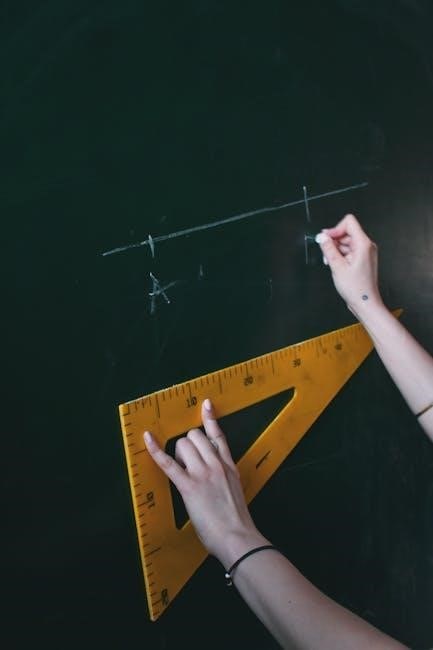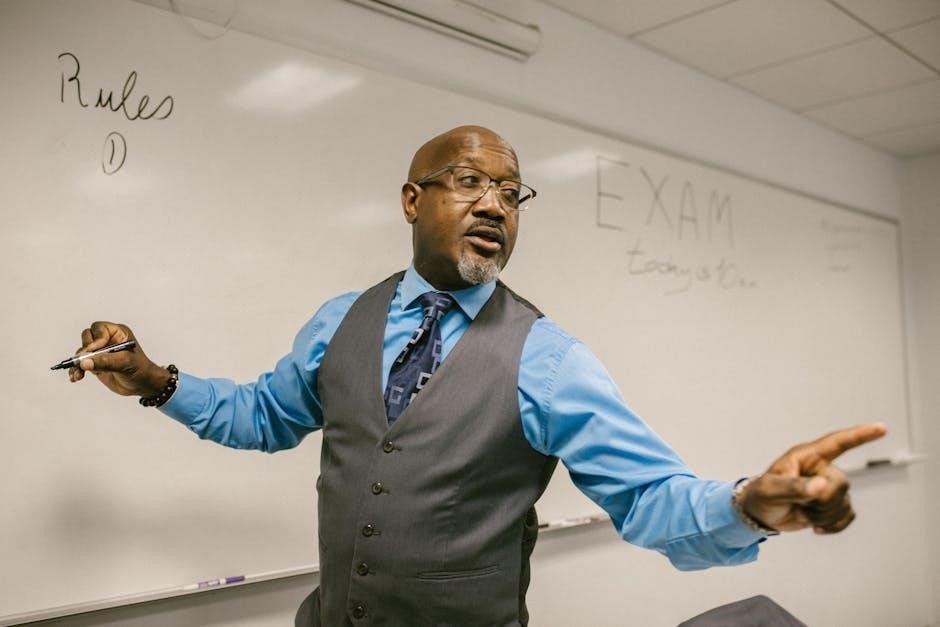Specialized academic instruction is a primary service provided to students with disabilities, available at school sites, and defined by federal regulations, ensuring access to the general education curriculum through adapted content and methodology.
Definition of Specialized Academic Instruction

Specialized academic instruction refers to the adaptation of content, methodology, or delivery of instruction to address the unique needs of students with disabilities. This type of instruction is designed to provide students with access to the general education curriculum and is typically provided by special education teachers. The definition of specialized academic instruction is derived from federal regulations, which emphasize the importance of adapting instruction to meet the individual needs of students with disabilities. According to these regulations, specialized academic instruction must be tailored to the specific needs of each student, taking into account their disability and individualized education program goals. By providing specialized academic instruction, schools can help ensure that students with disabilities have equal access to education and can reach their full potential. This type of instruction is essential for supporting the academic and personal growth of students with disabilities.
Purpose of Specialized Academic Instruction
The purpose of specialized academic instruction is to provide students with disabilities the support they need to access the general education curriculum and achieve academic success. This type of instruction is designed to address the unique needs of students with disabilities, helping them to overcome barriers to learning and reach their full potential. By providing specialized academic instruction, schools can help students with disabilities develop the skills and knowledge they need to succeed in school and beyond. The ultimate goal of specialized academic instruction is to enable students with disabilities to participate fully in the educational process and to become independent, self-sufficient individuals. Specialized academic instruction plays a critical role in helping students with disabilities to achieve their academic and personal goals, and is an essential component of a comprehensive education program. It helps to ensure that students with disabilities have equal access to education and can benefit from the same educational opportunities as their peers.

Key Components of Specialized Academic Instruction
Specialized academic instruction involves adapting content, methodology, and delivery to meet individual student needs and abilities effectively always.
Adapting Content, Methodology, or Delivery of Instruction
Adapting content, methodology, or delivery of instruction is a crucial aspect of specialized academic instruction, as it enables students with disabilities to access the general education curriculum. This adaptation process involves modifying the content, methodology, or delivery of instruction to meet the unique needs of each student. The goal is to provide students with the necessary support and accommodations to ensure they can learn and participate in the educational process. By adapting instruction, teachers can help students overcome barriers and achieve their academic goals. This may involve using different teaching methods, materials, or technologies to present information in a way that is more accessible and engaging for students with disabilities. Ultimately, adapting content, methodology, or delivery of instruction is essential for providing students with disabilities with a free and appropriate public education. This approach helps to ensure that all students have the opportunity to succeed and reach their full potential.
Addressing Unique Needs of Students with Disabilities
Specialized academic instruction is designed to address the unique needs of students with disabilities, providing them with the support and accommodations necessary to access the general education curriculum. This involves identifying the individual needs of each student and developing strategies to meet those needs. The instruction is tailored to the student’s learning style, abilities, and disabilities, ensuring that they can learn and participate in the educational process. By addressing the unique needs of students with disabilities, specialized academic instruction helps to level the playing field, providing equal access to education and opportunities for academic success. This approach recognizes that every student is unique, with their own strengths and challenges, and provides the necessary support to help them reach their full potential. The goal is to empower students with disabilities to become independent learners, equipped with the skills and knowledge necessary to succeed in school and beyond.

Implementation of Specialized Academic Instruction
Specialized academic instruction is implemented through collaborative efforts and individualized plans, ensuring effective delivery and support for students with diverse needs and abilities every day.
Role of Special Education Teachers
Special education teachers play a crucial role in the delivery of specialized academic instruction, as they are responsible for adapting the content, methodology, or delivery of instruction to meet the unique needs of students with disabilities. They work closely with general education teachers to ensure that students with disabilities have access to the general education curriculum. The role of special education teachers involves developing and implementing individualized education programs, providing specialized instruction, and assessing student progress. They also collaborate with other professionals, such as speech therapists and occupational therapists, to provide comprehensive support to students. Special education teachers must have the necessary training and expertise to provide effective specialized academic instruction, and they must be able to work collaboratively with other educators to ensure that students with disabilities receive a high-quality education. Their role is essential in helping students with disabilities to achieve their academic goals and reach their full potential.
Collaboration between Special Education and General Education Teachers
Collaboration between special education and general education teachers is essential for providing effective specialized academic instruction. This collaboration involves sharing information, resources, and expertise to ensure that students with disabilities receive a comprehensive education. Special education teachers work with general education teachers to adapt the curriculum, develop accommodations, and modify instructional strategies to meet the unique needs of students with disabilities. General education teachers provide input on the general education curriculum, while special education teachers provide expertise on specialized instructional techniques. By working together, teachers can identify areas where students need additional support and develop strategies to address these needs. This collaborative approach helps to ensure that students with disabilities have access to the general education curriculum and can participate fully in the educational process. Effective collaboration between special education and general education teachers is critical for providing high-quality specialized academic instruction and supporting the academic success of students with disabilities.

Importance of Individualized Education Programs
Individualized Education Programs are crucial for specialized academic instruction, providing tailored goals and objectives for students with disabilities, ensuring access to education and promoting academic success and progress.
Developing Goals and Objectives for Students with Disabilities
Developing goals and objectives for students with disabilities is a critical component of specialized academic instruction. This process involves identifying the unique needs and strengths of each student, and creating tailored goals and objectives that address these needs. The goals and objectives are typically developed by a team of educators, including special education teachers, general education teachers, and other support staff. They are designed to be specific, measurable, achievable, relevant, and time-bound, and are aligned with the student’s individualized education program. The goals and objectives may focus on academic skills, such as reading or math, or on functional skills, such as communication or daily living skills. By developing clear and meaningful goals and objectives, educators can help students with disabilities make progress and achieve success in their academic and personal lives. This process is ongoing and requires regular assessment and evaluation to ensure that the goals and objectives remain relevant and effective.
Assessment and Data Collection for Specialized Academic Instruction
Assessment and data collection are essential components of specialized academic instruction, as they inform instruction and guide decision-making. Educators use a variety of assessment tools and strategies to collect data on student progress, including standardized tests, quizzes, and performance tasks. This data is used to identify areas of strength and weakness, and to develop targeted interventions to support student learning. Regular progress monitoring is also used to assess the effectiveness of instruction and make adjustments as needed. By collecting and analyzing data, educators can refine their instruction and make data-driven decisions to improve student outcomes. The assessment and data collection process is ongoing and involves collaboration among educators, families, and other support staff to ensure that students receive the support they need to succeed. This process helps to ensure that specialized academic instruction is tailored to meet the unique needs of each student and is effective in promoting student learning and achievement.
